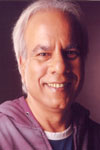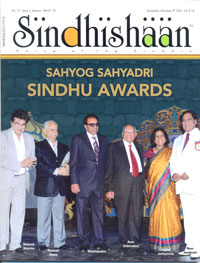END OF AN ERA
A short history of Sindhi writers
by -Arun Babani

At the time of partition, in the 50s and 60s, there were around 500 listed Sindhi writers, which included poets and playwrights. More importantly there were thousands, if not lacs of Sindhi readers. There were hundreds of Sindhi magazines, newsletters and newspapers. There were dozens of Sindhi printing presses in most major cities of India. Sindhi schools and colleges were in full swing. Sindhi Sammelans were held each year in big or small towns. Drama festivals, Bhagat nights and Mushairas were held almost daily or on week-ends in many cities and towns. Each book that came out was actually bought at Sindhi bookshops or libraries, read and written about in one or the other newspapers. Sindhi poets and writers were held in great esteem and respected as the torchbearers and leaders of the community. At that time there was no system of Chief Guests or of presiding over the occasions. The corrupting influence of awards and trophies had not yet appeared on the scene. There was the stage, mostly makeshift and rickety and there was the audience, huddled together in cold nights or on hot afternoons that passionately listened and lapped up each word that was read and spoken. There was some sort of a sacred vibration about the written word and a feeling of divine authority behind it. Great Sindhi writers like Mangharam Malkani, Hundraj Dhukayal, Prof. Ram Punjwani, Gobind Malhi, A. J. Uttam, Hari Dilgir and Narayan Shyam along with many more big names commanded respect and devotion from their readers.
The themes of Sindhi writings of those days are obviously related to the immense rehabilitation struggle that went on in Sindhi life after partition. Also a fair amount of attention is seen on what was left behind in Sindh, the painful memories of separation from the motherland that makes a soulful reading. As time went on, by the 70s, the influence of Western cultures began to surface in Sindhi writing. The psychological and existential elements of a deeply wounded civilization began becoming stronger and more intense. Along with the pain of a meaningless life there was the sex and sexual openness that crept up in Sindhi literature. There were many controversies of old meeting the new realities that are a part of every journey of life. Then there was the unmistakable influence of the Marxist literature of Russia which was overwhelmingly felt during this period. All in all, the 70s and 80s was the last great period of glory for Sindhi literature. Many new and big names appeared on the horizon and writers were passionate and forceful conducting many experiments and creating new pathways. Many respected names of these times are worth mentioning. Mohan Kalpana, Sugun Ahuja, Lal Pushp, Guno Samtani, Krishan Rahi, Popati Hiranandani, Arjan Shaad, M. Kamal, Shyam Jaisinghani, Sundari Uttamchandani, Kirat Babani, Arjan Sikayal, Prabhu Wafa, Gordhan Bharti, Kala Prakash, Moti Prakash, Lakhmi Khilani…that come to mind. But there were hundreds of writers doing very meaningful work and keeping the light of Sindhiat burning.
By the end of the 80s this bright picture began evaporating and the dismal reality of Sindhi literature that we see today, has its roots back then in the 80s. No new name in Sindhi writing has appeared since last twenty years. In the year 2000, Shri Kirat Babani, then the editor of Sindh Rises newsletter, invited Sindhi writers to send their stories on the theme and spirit of Sindhiat for a competition. Among the handful of stories received, the short story by Shri Raj Daswani came to be judged as the best entry. It was about an old woman’s death, portrayed as the death of the Sindhi language! Today naturally Sindhi language, along with a few more regional Indian languages has seen the last light of life. The literature that rose to glory from the 60’s fell from those heights by 2000. Those writers, poets and playwrights have also left this land. Preserving their writings for posterity seems to make sense.
Language is the mother of community and culture and a separate state is the father. In the absence of both our parents we are orphans, but we have fortunately inherited a property of immense value in the form of over 10,000 Sindhi books of literature. Let us realize this and claim it and preserve this precious heritage…The days of glory are over. Give a big hand for reality…!!


